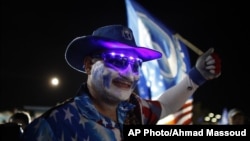For the first time, voters in Puerto Rico have advanced a non-binding referendum calling for statehood, a provision that could only be granted by the U.S. Congress.
A majority of voters voiced support for the measure Tuesday which calls for consideration of what would be the 51st U.S. state. Three previous ballot initiatives failed to get a majority of support.
Article IV of the U.S. Constitution gives Congress the authority to decide on state admissions. The last states admitted were Alaska and Hawaii in 1959.
Although Puerto Ricans are U.S. citizens, they cannot vote for presidents. They also have no representation in the Senate and limited representation in the House of Representatives.
Need for change
Justin O'Brien, the head of the U.S. Council for Puerto Rico Statehood, says these are the key reasons the island's status needs to change.
"The ability to participate in the government that passes laws and makes decisions that affect the livelihoods of all citizens, for 114 years, Puerto Ricans have not had that representation," said O'Brien.
U.S. President Barack Obama has said he would support the will of the Puerto Rican people on statehood. O'Brien says statehood is long overdue.
"Puerto Ricans have been citizens since 1917 but the quality of their citizenship has been one that has been dis-equal, or unequal rather," O'Brien added. "I think Puerto Ricans are clearly tired of that."
O'Brien says he believes the territory will continue to push for statehood although pro-statehood Governor Luis Fortuno lost his re-election bid Tuesday to Alejandro Garcia Padilla, a pro-commonwealth lawmaker.
In Tuesday's balloting, voters considered a two-question referendum that first asked if they favored the territory's current status. The second question allowed them to choose from three options, including one on statehood.
The U.S. seized the island from Spain in 1898 during the Spanish-American War.
Some information for this report was provided by AP, AFP and Reuters.
A majority of voters voiced support for the measure Tuesday which calls for consideration of what would be the 51st U.S. state. Three previous ballot initiatives failed to get a majority of support.
Article IV of the U.S. Constitution gives Congress the authority to decide on state admissions. The last states admitted were Alaska and Hawaii in 1959.
Although Puerto Ricans are U.S. citizens, they cannot vote for presidents. They also have no representation in the Senate and limited representation in the House of Representatives.
Need for change
Justin O'Brien, the head of the U.S. Council for Puerto Rico Statehood, says these are the key reasons the island's status needs to change.
"The ability to participate in the government that passes laws and makes decisions that affect the livelihoods of all citizens, for 114 years, Puerto Ricans have not had that representation," said O'Brien.
U.S. President Barack Obama has said he would support the will of the Puerto Rican people on statehood. O'Brien says statehood is long overdue.
"Puerto Ricans have been citizens since 1917 but the quality of their citizenship has been one that has been dis-equal, or unequal rather," O'Brien added. "I think Puerto Ricans are clearly tired of that."
O'Brien says he believes the territory will continue to push for statehood although pro-statehood Governor Luis Fortuno lost his re-election bid Tuesday to Alejandro Garcia Padilla, a pro-commonwealth lawmaker.
In Tuesday's balloting, voters considered a two-question referendum that first asked if they favored the territory's current status. The second question allowed them to choose from three options, including one on statehood.
The U.S. seized the island from Spain in 1898 during the Spanish-American War.
Some information for this report was provided by AP, AFP and Reuters.





